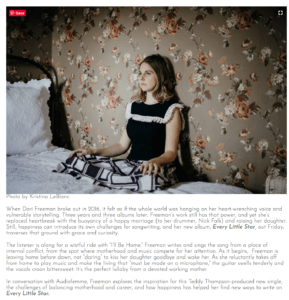
“Xenia” is a word of Greek origin, meaning “welcoming to strangers.” It’s a fitting moniker for musician Xenia Rubinos, a first generation American and songwriter focused on cultivating inclusivity and diversity with her music. “My hope for my music is that it brings together people from different ethnicities, sexual orientations, ages, cultures, and preferences and brings them together to enjoy music,” Rubinos said. Her June 3 release, Black Terry Cat, with its varied influences and cunning social commentary, lives up to that goal.
Rubinos’ father is a Cuban immigrant and her mother immigrated from Puerto Rico. Unlike most immigrant children, Rubinos’ parents desire to see her achieve financial stability didn’t keep them from honoring her love of music. As Rubinos said, “A lot of times for first-gen immigrant kids there’s a lot of pressure to be successful financially. For me, it was a rare case where my parents were just dreamers. They say it was a luxury for me to have a dream and go after it. So, they were actually really encouraging of me.”
In fact, when Rubinos was eight, her music-loving father encouraged her to apply for a scholarship for flute lessons at the University of Connecticut in Hartford where they lived. Rubinos got the scholarship, and through the opportunity, learned how to read music. She didn’t end up sticking with the flute, though. What Rubinos really wanted to do was sing like Mariah Carey.
“She was my musical idol at the time. I had posters of her on my walls and I learned her albums front to back. I liked that she had curly hair like me, I remember thinking that she was really pretty and her voice was so beautiful. She was just this woman that I looked up to,” Rubinos said. As for many, finding someone like her in music–in this case, an American woman of Latin descent–made a career in music seem possible for Rubinos.
Once a teen, Rubinos developed an interest in free improvisation at a summer camp that brought inner-city and suburban kids together and make art. That experience sparked an interest that eventually lead her to pursue a career as a jazz vocalist in Boston.
Once in Boston, the male-dominated jazz scene changed her path. Rubinos said, “When I got there, I had a crisis. It was a very male-centric environment and I felt like I was constantly trying to prove myself. And because I was a singer, there was an assumption that I didn’t know anything about music, and that I was just a pretty face. It got really bad to the point where I stopped singing for a while and I got into composition.”
Though unfortunately and unfairly driven away from singing and performing, Rubinos channeled her creative energies into studying the craft of composition. She wanted to prove to herself (and to the boys) that she knew as much as they did. “It was a great period where I started to discover a lot of [different musicians], like Charles Mingus, and that was really inspirational—I started learning how to write for horns and do big band arrangements,” said Rubinos.
This focus on arranging and part writing is what gives the songs on Rubinos’ new record, Black Terry Cat, the quality of a complex braid: three or more clear, minimal music ideas woven together into something dense, yet still translucent.
“Songs are houses to me, everything is there for a reason. The moment you change one thing the house changes shape or falls down. I like that aspect of writing, figuring out different ways to structure parts. Once you change that one thing, it doesn’t work. There’s not much room to mess with it. It’s all there for a reason,” said Rubinos
Houses aren’t constructed alone. Rubinos has her long-time collaborator, Marco Bucelli, to help her lay the brick and pour cement. Her friend and musical partner for almost a decade, Bucelli really understands Rubino’s vision. She said, “He helps me with a sound—I tend to be pretty bare bones about sounds—I’ll bring it to him and ask him to make it sound a certain way. He was crucial in the soundscape of this album.”
Black Terry Cat is lyrically powerful as well: Rubinos doesn’t shy away from drawing on her immigrant experience or her political engagement and social awareness.
“A lot was on my mind at the time I was writing this album; there was a lot of gun violence going on, the Black Lives Matter movement–that was on my mind constantly. My dad was a social worker who advocated a lot for Hispanic rights in Hartford. He was very politically engaged and I think that’s part of me for sure.” Thus, songs like “Mexican Chef”—an observation of how many “brown” people work behind the scenes to support the white majority—cuts razor-sharp with its honesty.
“I really work to project joy and to be honest and generous in my music all the time. I’m trying to show love for people and the world around me, how to be sensitive, how to listen more. I’m constantly trying to figure it out,” said Rubinos, “I feel very lucky to have music to show that because it’s one of the most ruthless mirrors to who you are. You’re constantly looking at yourself. And it’s not always this glamorous, pretty, easy and fun picture. It can be really tough to look at yourself and to constantly ask, what is it that I’m saying, why did you just do that?”
This is the sort of intentionality and authenticity at the pulse of Black Terry Cat, which Rubinos will be touring with internationally starting in the Fall. She’s excited to get on the road and share her music.
“I don’t know if I can say that I’m changing the world—but I do know there’s something really special that goes on when I get to play music live to an audience. I’m learning from them: we’re having this kind of communion together. This exchange of energy that I hope can create good energy that will impact the world.”
For more information on Xenia Rubinos visit her website.




